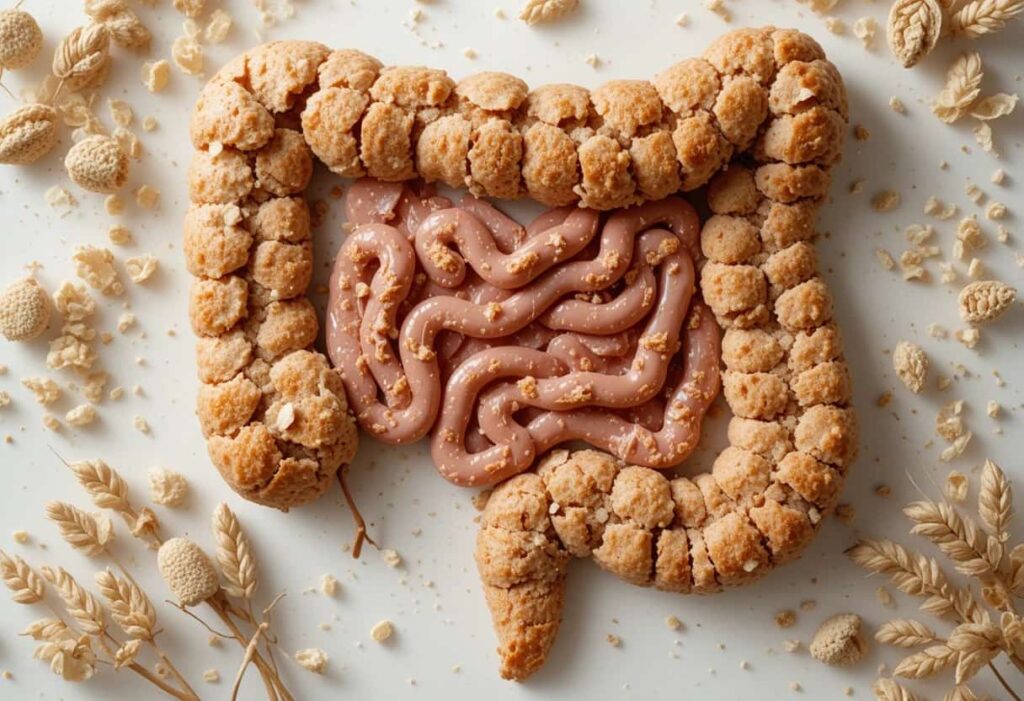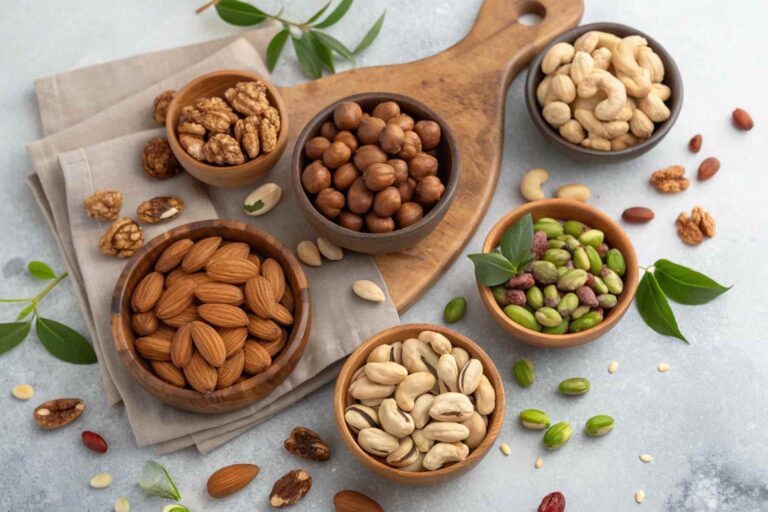Does Coeliac Disease Cause Weight Gain – Expert-Backed Guide You Can Trust!
Coeliac disease is no longer viewed through a narrow lens of weight loss and malnutrition. Today, experts recognize that it can affect people differently, including those who experience weight gain, especially after beginning a gluten-free diet. As awareness and diagnostic tools improve, more cases are being detected at earlier stages, revealing a broader range of symptoms and outcomes.
Factors such as intestinal healing, food choices, and metabolic changes all play a role. This article takes a closer look at how coeliac disease can lead to weight gain and what steps can help manage it effectively. Understanding this shift is crucial for both patients and healthcare providers. With the right guidance, individuals can achieve better health outcomes and avoid common dietary pitfalls.
What Is Coeliac Disease?
Coeliac disease is a lifelong autoimmune disorder where consuming gluten—found in wheat, barley, and rye—triggers an immune reaction that damages the small intestine’s lining. This damage hinders nutrient absorption and can lead to a wide range of symptoms, from digestive issues like bloating and diarrhea to more severe complications such as anemia, infertility, bone loss, and neurological problems.

If left untreated, it may even increase the risk of intestinal cancer. The only effective treatment is a strict gluten-free diet. Early diagnosis is crucial to prevent long-term health issues and improve overall well-being.
What Are the Common Symptoms of Coeliac Disease?
Symptoms of coeliac disease can vary greatly between individuals, and may not always appear in the digestive system alone. Below are five key symptom categories, each explained in more detail:
- Digestive issues: Coeliac disease often causes bloating, abdominal pain, excessive gas, chronic diarrhea, or constipation. These symptoms occur due to inflammation in the small intestine, which interferes with normal digestion and nutrient absorption, leading to significant discomfort and digestive irregularity in many patients.
- Systemic effects: Fatigue and weakness are common due to poor nutrient absorption, especially iron, causing anemia. Some individuals also report headaches, dizziness, or brain fog, which may stem from vitamin deficiencies or immune system activity triggered by gluten exposure.
- Skin and joint problems: Many people experience an itchy, blistering skin rash called dermatitis herpetiformis. Additionally, inflammation may affect the joints, leading to pain or stiffness. Mouth ulcers are another frequent complaint, caused by nutritional deficiencies, particularly of B vitamins and iron.
- Weight changes: While weight loss is typical due to malabsorption, some individuals may gain weight, especially after switching to a gluten-free diet. This may be due to improved absorption, increased appetite, or high-calorie, processed gluten-free food choices that are often low in fiber.
- Silent symptoms: Some individuals, particularly adults, may show no obvious symptoms despite having intestinal damage. This “silent” form of coeliac disease is dangerous because it can go undiagnosed for years, increasing the risk of long-term complications like osteoporosis, infertility, or certain cancers.
Can Coeliac Disease Lead to Weight Gain?
While weight loss remains a classic symptom of undiagnosed coeliac disease, weight gain is increasingly observed, especially once a person starts a gluten-free diet. The body begins to heal, nutrient absorption improves, and the intestines function more efficiently, sometimes resulting in unexpected weight gain. Here’s where the complexity comes in: weight gain can occur before or after diagnosis, depending on the individual’s biology and eating patterns.
In some cases, chronic inflammation may disrupt hormones that regulate metabolism.
Processed gluten-free foods are often high in sugar and fat, contributing to weight gain.
Additionally, improved energy and appetite after diagnosis may lead to increased calorie intake.
What Are the Factors Contributing to Weight Gain in Coeliac Disease?
To make sense of how this autoimmune disease can lead to weight changes, let’s break down the main contributing factors in an easy-to-read table.
Key Factors Behind Weight Gain in Coeliac Disease:
| Cause | Explanation |
| Healing Gut Lining | After starting a gluten-free diet, the intestine absorbs more nutrients |
| Gluten-Free Processed Foods | Many are calorie-dense, high in sugar and low in fiber |
| Improved Appetite | As symptoms improve, appetite returns, often leading to increased calorie intake |
| Hormonal Imbalance | Gluten sensitivity can affect metabolic and hormonal functions |
| Sedentary Lifestyle | Fatigue and pain before diagnosis may reduce physical activity |
| Misguided Dietary Choices | Mistaking “gluten-free” for “healthy” can lead to overeating unhealthy snacks |
Does Weight Gain Occur Before or After Diagnosis?
Before Diagnosis:
In most traditional cases, people suffering from undiagnosed coeliac disease experience weight loss due to malabsorption. However, there are exceptions. Inflammation, fluid retention, and metabolic slowdown can cause mild weight gain even before diagnosis. These cases often confuse both patients and doctors, delaying proper diagnosis.
After Diagnosis:
Once a person removes gluten from their diet, the body begins to repair the damaged intestinal lining, leading to better nutrient uptake. This increased efficiency can cause an increase in body weight, especially if dietary choices lean heavily on processed gluten-free foods high in carbohydrates and fats.
Gluten-Free Diet: Friend or Foe?
The gluten-free diet is the only treatment for coeliac disease. However, the growing commercial market for gluten-free products has introduced new challenges. Many of these foods are less nutritious, often made with rice flour, tapioca starch, and potato starch—ingredients that lack fiber, protein, and key nutrients.
Nutritional Comparison of Common Foods:
| Food Type | Calories | Fiber (g) | Protein (g) | Comments |
| Whole Wheat Bread | 70 | 2 | 3 | Contains gluten but is high in nutrients |
| Gluten-Free White Bread | 90–110 | <1 | 1–2 | Often lower in fiber and higher in sugar |
| Brown Rice | 215 | 3.5 | 5 | Naturally gluten-free, nutritious |
| Gluten-Free Cookies | 130–180 | <1 | <1 | Often high in sugar and fats |
How Do Hormones and Metabolism Affect Weight in Coeliac Disease?
Chronic inflammation caused by gluten exposure can impact various hormones, affecting how the body manages weight and energy. Below are five key points that explain this connection:
- Thyroid dysfunction: Coeliac disease increases the risk of autoimmune thyroid disorders, which can lead to a slower metabolism and unexpected weight changes.
- Insulin resistance: Inflammation may affect how the body responds to insulin, potentially leading to blood sugar imbalances and fat storage.
- Elevated cortisol levels: Chronic stress and inflammation can raise cortisol, a hormone linked to increased belly fat and appetite.
- Hormonal appetite signals: Disrupted hormones may confuse hunger and fullness signals, causing overeating or irregular eating patterns.
- Metabolic slowdown: Healing after diagnosis may not immediately reset the metabolism, leading to continued weight gain if diet is not carefully managed.
Is There a Link Between Coeliac Disease and Obesity?
A surprising number of patients are now being diagnosed as overweight. Recent studies suggest that nearly 30–40% of coeliac patients may be overweight or obese at diagnosis. This shift may be due to earlier detection, improved awareness, and genetic variations in how individuals react to gluten.
In some cases, malabsorption may coexist with weight gain due to hormonal imbalances.
The modern gluten-free diet, often high in processed foods, can contribute to excessive calorie intake. Sedentary lifestyles and unrecognized symptoms can also delay diagnosis and worsen weight issues.
What Are the Pediatric Weight Concerns in Coeliac Disease?

Children with coeliac disease often face unique nutritional challenges. Early diagnosis and proper diet are essential, but sudden improvements in appetite and absorption can also lead to rapid weight gain. Here are five key points to manage pediatric weight effectively:
- Monitor growth regularly: It’s important to track a child’s height and weight on standardized growth charts. Sudden weight gain or irregular growth patterns may indicate the need for dietary adjustments, even after starting a gluten-free diet, to maintain healthy development and prevent future complications.
- Provide balanced meals: A well-rounded gluten-free diet should include fruits, vegetables, whole grains like quinoa or brown rice, lean proteins, and healthy fats. Ensuring the child gets all necessary nutrients helps support steady growth without excessive weight gain or nutritional deficiencies.
- Limit processed gluten-free snacks: Many gluten-free packaged snacks are high in sugar, sodium, and unhealthy fats. These foods can lead to unnecessary calorie intake and rapid weight gain, especially in children who are newly recovering from malnutrition or undernourishment.
- Consult a pediatric dietitian: A trained dietitian can create personalized meal plans to ensure the child meets their nutritional needs without overeating. Regular consultations also help parents adjust food portions and improve the variety of nutrient-dense foods in the child’s diet.
- Encourage physical activity: Regular movement like playing, walking, or sports helps maintain a healthy metabolism and prevents excessive fat gain. Encouraging an active lifestyle is especially important after the child starts gaining weight on a gluten-free diet.
How Can You Manage a Healthy Weight With Coeliac Disease?
Here are five essential strategies, each written in exactly 55 words, to help manage weight effectively when living with coeliac disease:
Focus on whole, naturally gluten-free foods:
Choose foods like fresh fruits, vegetables, lean meats, eggs, legumes, nuts, and gluten-free whole grains. These are rich in nutrients and fiber, keeping you full longer and aiding digestion. They reduce cravings, help balance blood sugar levels, and support healthy weight control without adding unnecessary processed ingredients or calories.
Limit intake of gluten-free packaged snacks and desserts:
Many packaged gluten-free snacks are high in sugar, salt, and unhealthy fats. These products often lack fiber and essential nutrients, contributing to weight gain. Limiting processed foods and preparing snacks at home using wholesome ingredients allows for better calorie control and improved nutritional quality in your daily diet.
Stay physically active:
Regular exercise helps boost your metabolism, improve digestion, and burn excess calories. Whether it’s brisk walking, yoga, dancing, or swimming, consistent physical activity enhances your energy, reduces stress, and supports weight management. Movement also complements the benefits of a gluten-free diet by encouraging long-term health, strength, and emotional well-being.
Work with a registered dietitian:
A dietitian can help you build a gluten-free meal plan that is balanced, calorie-conscious, and nutrient-rich. They provide expert guidance on portion control, label reading, and supplement use. This professional support ensures you avoid deficiencies and unnecessary weight gain while helping you stay accountable to your health goals.
Consider supplementation for nutrient gaps:
Coeliac disease may cause deficiencies in vitamins and minerals due to poor absorption. Taking supplements like iron, B12, calcium, and folate restores balance, reduces fatigue, and curbs cravings. Correcting these deficiencies supports metabolism, helps regulate appetite, and contributes to healthier weight management throughout your recovery and beyond.
How Do Psychological and Lifestyle Factors Influence Weight in Coeliac Disease?

Living with coeliac disease goes beyond avoiding gluten—it impacts emotional well-being and daily routines. Anxiety around cross-contamination, restricted food choices, and social isolation can lead to disordered eating patterns. Below are key psychological and lifestyle effects that may contribute to weight gain or imbalance in individuals managing coeliac disease:
- Emotional eating: Stress and frustration from dietary limitations may lead to eating for comfort rather than hunger, often choosing high-calorie, gluten-free snacks as coping mechanisms.
- Food aversions: Fear of gluten exposure can result in restricted eating or repetitive food choices, which may lead to overeating safe foods high in sugar or fat.
- Disrupted social habits: Avoiding social events or dining out due to fear of gluten can increase feelings of isolation, which may trigger emotional or binge eating at home.
- Anxiety and control issues: The constant pressure to monitor ingredients can increase anxiety and lead to obsessive behaviors around food, affecting both mental and physical health.
- Lack of support: Without proper emotional or social support, individuals may struggle to maintain a healthy mindset and balanced eating habits, increasing the risk of weight gain or nutritional deficiencies.
Counseling, therapy, or support groups can offer effective coping strategies to improve emotional resilience and build a healthier, more flexible relationship with food and lifestyle.
FAQs:
1. Can coeliac disease cause weight gain even before diagnosis?
Yes, although uncommon, some individuals may experience weight gain before diagnosis due to inflammation-related fluid retention or hormonal imbalances. Additionally, some may overeat in response to constant fatigue or nutrient deficiencies, unknowingly compensating for poor absorption, which can lead to gradual weight gain.
2. Why do some people gain weight after starting a gluten-free diet?
Once the gut begins to heal, nutrient absorption improves significantly. Combined with calorie-dense gluten-free alternatives and a returning appetite, this often leads to unexpected weight gain. Without mindful food choices, it’s easy to consume more calories than needed, especially from processed gluten-free products.
3. Is it harder to lose weight on a gluten-free diet?
It can be. Many gluten-free substitutes are higher in sugars, fats, and starches compared to their gluten-containing counterparts. These options are often low in fiber and protein, making it harder to feel full. This can lead to overeating and make weight loss more challenging without careful planning.
4. How can I tell if my weight gain is due to coeliac disease or something else?
Tracking symptoms like bloating, fatigue, and irregular digestion alongside weight changes can help. A healthcare provider can run tests to assess for coeliac disease and rule out other causes like thyroid dysfunction or insulin resistance, which can also affect weight.
5. Can coeliac disease affect body composition, not just weight?
Absolutely. Coeliac disease can lead to muscle loss and fat accumulation, especially in untreated or poorly managed cases. Even if the scale doesn’t show significant changes, shifts in muscle mass and fat distribution can impact overall health, energy, and physical strength.
Conclusion:
Coeliac disease presents differently for everyone, and weight gain is now recognized as a valid and sometimes overlooked part of the condition’s complexity. Whether it occurs before or after diagnosis, it’s often influenced by hormonal shifts, metabolic changes, and food choices made during recovery.
With the rise of processed gluten-free foods and emotional challenges tied to lifelong dietary restrictions, managing weight can become difficult without proper guidance. By understanding these connections and focusing on balanced nutrition, regular activity, and emotional support, individuals with coeliac disease can take control of their health and maintain a healthier weight long-term.
Related post:






